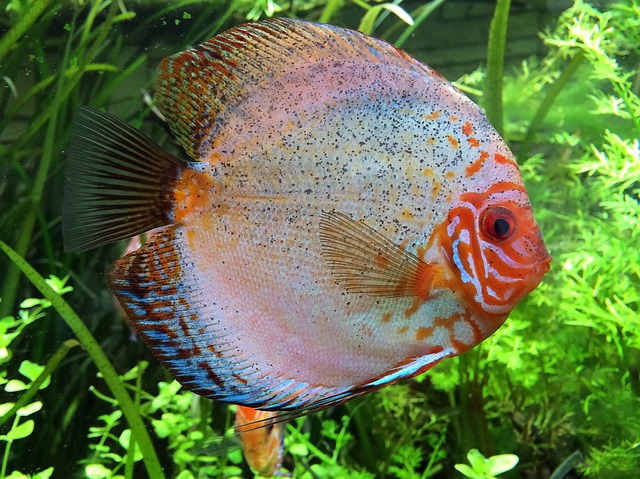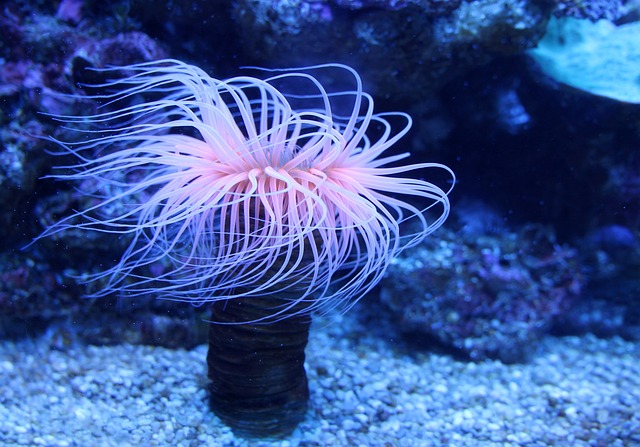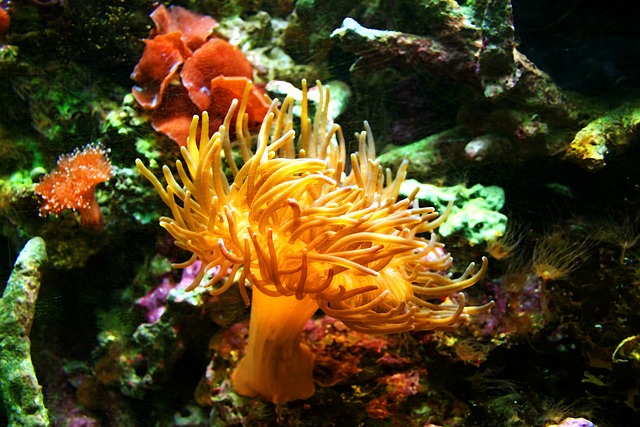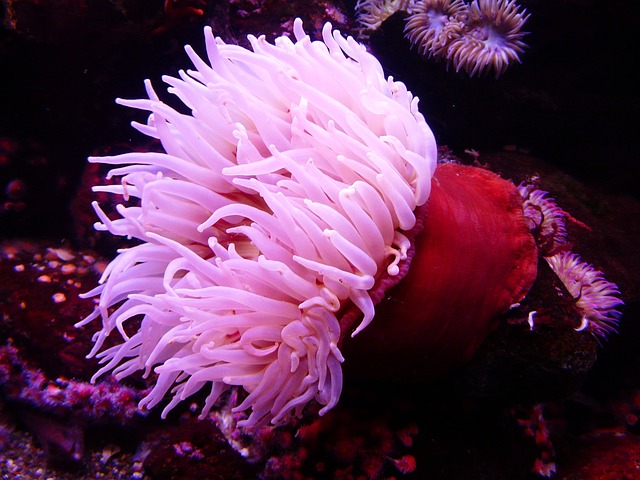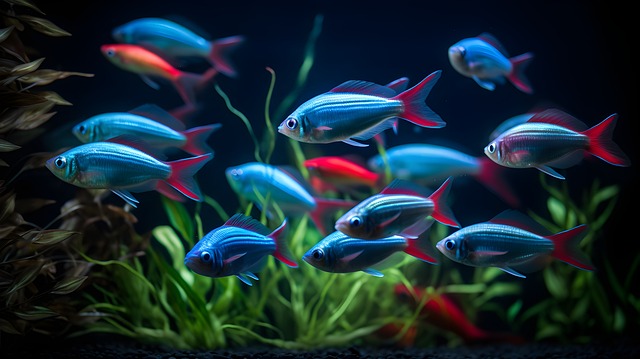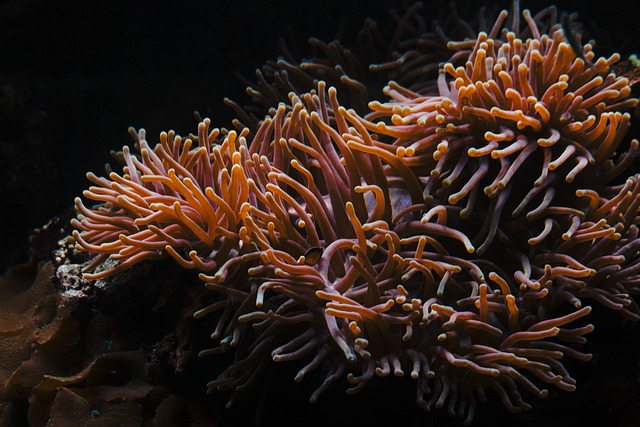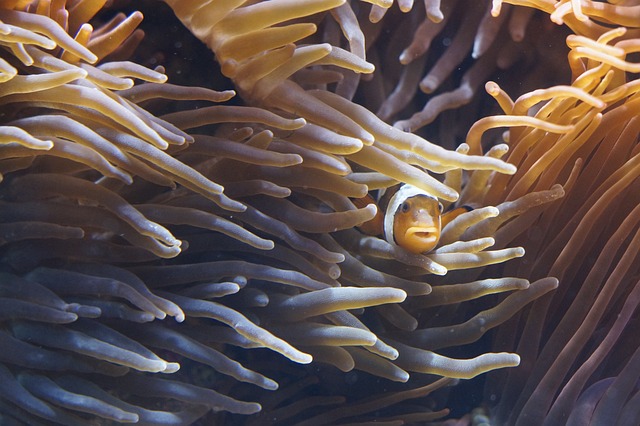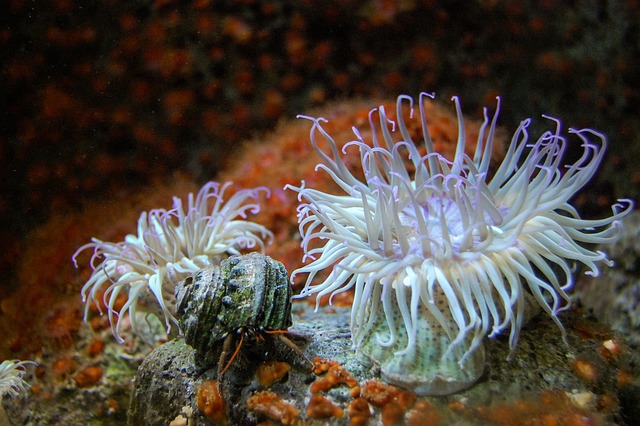Discus fish are known for their vibrant colors and unique personalities, making them popular among aquarium enthusiasts. However, ensuring these fish receive a balanced and nutritious diet is essential to maintain their health and happiness.
One common question is whether discus fish can eat bloodworms, a popular food choice for many aquarium fish.
Bloodworms are a type of aquatic worm commonly used as a food source for fish.
They are high in protein and are often recommended to supplement a fish’s diet. However, when it comes to discus fish, there are some essential factors to consider before feeding them bloodworms
. In this article, we will explore whether discus fish can eat bloodworms and provide some vital information to help you decide about your fish’s diet.
Can Discus Fish Eat Bloodworms?
Discus fish are known for their vibrant colors and are a popular choice among aquarium enthusiasts. A common question that arises is whether discus fish can eat bloodworms.
The answer is yes; discus fish can eat bloodworms.
Bloodworms are a nutritious food source that can provide a good source of protein for discus fish.
However, it is essential to note that bloodworms should not be the sole food source for discus fish. A varied diet is necessary for their overall health and well-being.
Feeding bloodworms to discus fish as a treat or supplement to their regular diet is recommended. Overfeeding bloodworms can cause digestive issues and lead to health problems.
Feeding bloodworms in moderation and only a few times a week is best.
When feeding bloodworms to discus fish, it is essential to ensure they are of good quality and free from contaminants. Frozen bloodworms are popular among aquarium enthusiasts as they are convenient and easy to store.
In summary, discus fish can eat bloodworms as a balanced diet. However, feeding them in moderation and as a supplement to their regular diet is essential.
Benefits of Bloodworms for Discus Fish
Nutritional Value
Bloodworms are a highly nutritious food for discus fish. They are rich in protein, which is essential for the growth and development of fish.
Bloodworms are also a good source of vitamins, minerals, and amino acids necessary for maintaining discus fish’s health.
The table below shows the nutritional composition of bloodworms per 100 grams:
| Nutrient | Amount |
|---|---|
| Protein | 12.9 g |
| Fat | 0.3 g |
| Carbohydrates | 0.4 g |
| Fiber | 0.5 g |
| Calcium | 20 mg |
| Phosphorus | 70 mg |
| Iron | 3.2 mg |
| Vitamin B12 | 0.5 mcg |
As you can see, bloodworms are a rich source of protein, with protein content comparable to that of fish meal. They also contain significant amounts of iron and vitamin B12, essential for producing red blood cells and maintaining the nervous system, respectively.
Digestibility
Bloodworms are highly digestible, which means that they are easily broken down and absorbed by the digestive system of discus fish.
This is important because it ensures that the fish can obtain maximum nutrition from their food.
Bloodworms are also low in fiber, so they do not cause digestive problems such as constipation or bloating in discus fish. This is particularly important for captive fish, which may be prone to digestive issues due to their limited diet and lack of exercise.
In conclusion, bloodworms are highly nutritious and digestible for discus fish. They are a good source of protein, vitamins, and minerals and are easily absorbed by the fish’s digestive system. As such, they are an excellent addition to the diet of discus fish.
Potential Risks of Feeding Bloodworms to Discus Fish
Discus fish are popular among aquarium enthusiasts due to their vibrant colors and unique appearance. Bloodworms are one of the most common types of food fed to discus fish.
While bloodworms can provide a healthy source of protein for discus fish, some potential risks are associated with feeding them this type of food.
Parasitic Infections
One of the main risks of feeding bloodworms to discus fish is the potential for parasitic infections. Bloodworms are known to carry parasites such as nematodes, which can infect the digestive system of discus fish.
These parasites can cause various health issues for discus fish, including loss of appetite, weight loss, and even death.
To minimize the risk of parasitic infections, it is essential to feed discus fish high-quality bloodworms that have been properly cleaned and processed.
It is also recommended to avoid overfeeding discus fish with bloodworms, as this can increase the risk of parasitic infections.
Overfeeding Issues
Another potential risk of feeding bloodworms to discus fish is overfeeding. Bloodworms are a high-protein food source, and feeding too much of this type of food can lead to digestive issues and other health problems for discus fish.
To prevent overfeeding, it is essential to feed discus fish the recommended amount of bloodworms per feeding. It is also recommended to feed discus fish a balanced diet with various food sources, such as pellets and live foods.
In conclusion, while bloodworms can be a healthy source of protein for discus fish, some potential risks are associated with feeding them this type of food.
By taking precautions such as feeding high-quality bloodworms and avoiding overfeeding, discus fish owners can help minimize these risks and keep their fish healthy and happy.
Alternatives to Bloodworms for Discus Fish
Discus fish are known for their finicky eating habits, and finding the right food for them can be challenging. While bloodworms are a popular choice, they may not be suitable for all discus fish. Fortunately, there are other options available that can provide the necessary nutrients for your fish.
Brine Shrimp
Brine shrimp are a popular alternative to bloodworms for discus fish. They are rich in protein and essential amino acids, making them an excellent source of nutrition for your fish. Brine shrimp are also easy to digest, which can help prevent digestive issues in your fish.
One of the benefits of feeding your discus fish brine shrimp is that they are available in both live and frozen forms. Live brine shrimp are ideal for larger discus fish, while frozen brine shrimp can be fed to smaller fish. Additionally, brine shrimp can be easily obtained from most pet stores.
Daphnia
Daphnia is another alternative to bloodworms for discus fish. They are small crustaceans rich in protein and other essential nutrients your fish need to thrive. Daphnia are also easy to digest, which can help prevent digestive issues in your fish.
One of the benefits of feeding your discus fish daphnia is that they are available in both live and frozen forms. Live daphnia are ideal for larger discus fish, while frozen daphnia can be fed to smaller fish. Additionally, daphnia can be easily obtained from most pet stores.
In conclusion, bloodworms are not the only option for feeding your discus fish. Brine shrimp and daphnia are both excellent alternatives that can provide the necessary nutrients for your fish. It is important to remember that each fish is unique, and you may need to experiment to find the right food for your discus fish.
Bloodworms: A Closer Look
Bloodworms are a popular food source for many types of fish, including discus fish. These small, red worms are the larvae of the non-biting midge fly, and they are commonly sold frozen or freeze-dried for use as fish food.
One of the main benefits of feeding bloodworms to discus fish is their high protein content. Discus fish require a diet high in protein to support their growth and overall health, and bloodworms are an excellent source of this vital nutrient.
In addition to protein, bloodworms also contain various other essential nutrients, including vitamins and minerals. For example, bloodworms are a good source of vitamin E, which is necessary for maintaining healthy skin and scales in fish.
However, it is essential to note that bloodworms should not be the sole source of nutrition for discus fish. While they are nutritious food, they should be fed in combination with other types of food to ensure that the fish receive a well-rounded diet.
It is also essential to avoid overfeeding bloodworms, as this can lead to digestive issues and other health problems in discus fish. As with any fish food, it is necessary to follow the manufacturer’s instructions for feeding and to monitor the fish’s health closely to ensure they receive the proper nutrition.
Conclusion
In conclusion, discus fish can eat bloodworms as part of their diet. Bloodworms provide essential nutrients that benefit the fish’s health and growth. However, it is important to note that bloodworms should not be the sole source of nutrition for discus fish.
Discus fish require a varied diet that includes a combination of live, frozen, and dried foods. A balanced diet ensures the fish receive all the nutrients for their growth and well-being.
It is also essential to feed discus fish the appropriate amount of food. Overfeeding can lead to health problems such as obesity and poor water quality. Discus fish should be fed small amounts of food several times daily rather than one large meal.
Bloodworms can be a healthy addition to a discus fish’s diet when fed in moderation as part of a balanced diet. It is essential to provide the fish with a variety of foods and to feed them the appropriate amount to ensure their optimal health and well-being.
Frequently Asked Questions
What are some alternative foods for discus fish?
Discus fish are omnivores and require a varied diet to stay healthy. Some alternative foods that can be fed to discus fish include brine shrimp, daphnia, krill, and earthworms. It is essential to ensure that the food given to discus fish is high in protein and low in fat.
How often should I feed my discus fish?
Discus fish should be fed small amounts of food multiple times a day. It is recommended to feed discus fish 3-4 times a day, with each feeding consisting of only a small amount of food. Overfeeding can cause health problems for discus fish, so it is essential to be mindful of the amount of food given.
Why do discus fish spit out their food?
Discus fish may spit out their food for a variety of reasons. It could be due to the food being too large, too hard, or not the right texture. It could also be a sign of illness or stress. Observing discus fish while eating is essential to ensure they are consuming their food correctly.
Can discus fish eat frozen bloodworms?
Yes, discus fish can eat frozen bloodworms. Frozen bloodworms are a popular food choice for discus fish and are readily available at most pet stores. It is essential to ensure the bloodworms are properly thawed before feeding them to discus fish.
Are bloodworms harmful to discus fish?
Bloodworms are not harmful to discus fish when fed in moderation. However, ensuring that the bloodworms are high quality and free from harmful bacteria or parasites is essential. It is also important to vary the discus fish’s diet to ensure they receive all of the necessary nutrients.
What is the best way to feed discus fish?
The best way to feed discus fish is to offer small amounts of food multiple times daily. Observing the fish while eating is essential to ensure they are consuming their food correctly. Uneaten food should be removed from the tank to prevent it from fouling the water.

